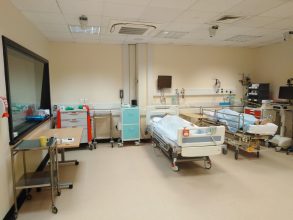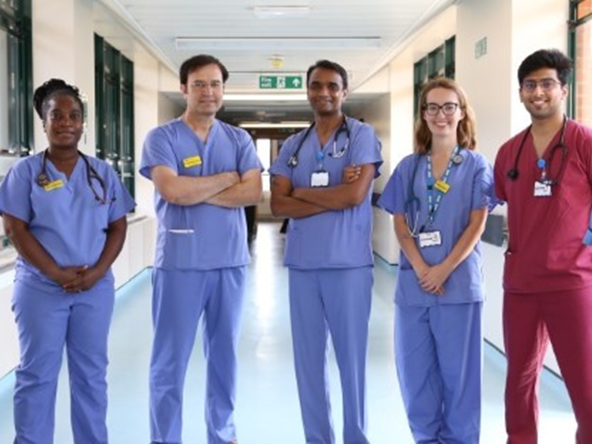On the 1st April 2021, we completed a merger of 7 hospitals across Chichester, Worthing, Shoreham, Haywards Heath and Brighton and Hove, together with numerous community and satellite services to become University Hospitals Sussex. We are now responsible for all district general acute services for patients across Brighton and Hove, West Sussex, Mid Sussex and parts of East Sussex. We also provide specialised and tertiary services across Sussex and parts of the South East, including neuroscience, arterial vascular surgery, neonatology, specialised paediatric, cardiac, cancer, renal, infectious diseases and HIV medicine services.
Trust Contact Details
Royal Sussex County Hospital, Eastern Road , Brighton, East Sussex, BN2 5BE
Trust switchboard:
01273 696955
Princess Royal Hospital, Lewes Road, Haywards Heath, West Sussex, RH16 4EX
Trust switchboard:
014444 441881
Foundation Training Programme Directors
Dr Evan Coughlan
Professor Timothy Chevassut
Mr Prodip Das
Mr Ketan Desai
Director of Medical Education
Mr David Beattie
Head of Medical Education and Quality
Bebba Smithers
Lead for Undergraduate and Foundation
Steve Dorey
Site Medical Education Manager & Pan-Trust Lead for Doctors’ Inductions
Katie Hines
Quality Manager
Laura Innes
Foundation Manager
Louise Virgo – based at the Royal Sussex County Hospital uhsussex.pgme-foundation-rschprh@nhs.net
ext. 63344
Link to Trust specific medical education page – PGME – Postgraduate Medical Education – Postgraduate Medical Education
Facilities
Postgraduate Centre
Postgraduate Centres are situated on all main hospital sites and are headed by the Director of Medical Education and supported by the Clinical Tutors.
The role of the Euan Keat Education Centre based at the Princess Royal Hospital (PRH) and the Sussex Postgraduate Centre based within the Audrey Emerton Building (AEB) is to ensure that the training provided for postgraduate doctors working within the Trust meets the educational standards prescribed by the HEKSS and the GMC.
The Education Centre at the Princess Royal Hospital is located on the second floor opposite the Library. It has three lecture theatres (two of which can be opened up into one large space seating 125), a seminar room, dining room, and simulation suite. Each room is fully equipped with state of the art audio visual facilities, plus video conferencing and live links to the operating theatres and simulation suite.
The Education Centre, Brighton is located on the ground floor of the AEB, which is opposite the main entrance to the Royal Sussex County Hospital (RSCH) and is a combined education facility for the Trust and Brighton & Sussex Medical School (BSMS). The AEB provides state of the art teaching facilities with 16 teaching rooms, 2 lecture theatres and a clinical skills lab.
Accommodation
Accommodation is available but availability is limited. Charges are made dependent on room size and site.
Social Activities
Whether new or old to the area, there are always activities available no matter the weather. The Doctors’ Mess not only restocks the Mess with weekly food and snacks on the RSCH and PRH sites, but also organises events on a regular basis. From weekly beach volleyball, monthly pay day socials, and special Mess Balls twice a year, there’s always something going on.
Doctors from all grades are encouraged to participate in events and in the organisational responsibilities for these.
You can find more about other health, wellbeing and social activities available at: https://www.uhsussex.nhs.uk/wellbeing/
Knowledge and Library Facilities
The training programme is supported by a first class Knowledge and Library Service who ensure you have the knowledge you need to do your job. They provide access to the most up-to-date evidence-based information to help you:
- Make the best decisions for your patients
- Lead journal clubs and case reports
- Improve your medical career prospects
- Teach medical students and your peers
- Write and publish journal papers
- Contribute to innovative research
Trusted Information When You Need It
Point-of-care information tools such as UpToDate and BMJ Best Practice help you make quick decisions based on the latest evidence. We also provide textbooks and journals in all specialties, along with collections of case reports, clinical images and videos.
You can access many of our resources online. All you need is an NHS OpenAthens account for Brighton & Sussex University Hospitals NHS Trust. Register at: https://openathens.nice.org.uk
Stay Ahead of the Game
Save yourself time and ensure you are up-to-date on the latest developments in health care by signing up to KnowledgeShare at www.knowledgeshare.nhs.uk. This current awareness service is tailored to your interests and links you with colleagues in other trusts to enable sharing of research and best practice. Ask us for the evidence to inform your research, audit or service improvement. If you want to find the very best evidence but have limited time, we’ll search for you and will provide you with a selected summary of what we have found. You can request a search using our online request form on our website https://www.uhsussex.nhs.uk/professionals/knowledge-and-libraries/updates/
Find and Appraise Evidence More Easily
Whether you need a refresher on MEDLINE, tips on facilitating journal clubs or guidance on critical appraisal, our team can help. Find the right session for you on our website’s teaching section: https://www.uhsussex.nhs.uk/professionals/knowledge-and-libraries/information-skills-teaching/
24/7 Access to Information
Make the most of your on-call time and nights. The libraries at RSCH and PRH are available for you to use at any time of the day or night and you can borrow books using the self-service kiosks. Our PCs, photocopying, printing and scanning facilities offer a convenient and quiet place to work and study. Software to manage references or analyse statistics is available on selected PCs.
Doctors can also use the libraries at Worthing Hospital and St Richard’s Hospital in Chichester.
Visit all our services and resources at Knowledge and libraries – University Hospitals Sussex NHS Foundation Trust (uhsussex.nhs.uk) or contact us on uhsussex.library@nhs.net.
IT facilities
Excellent IT facilities are available in the Health Sciences Library at PRH and also in the Audrey Emerton Building Library at RSCH on a 24-hour basis.
We are also proud to have developed an internal training website, iris. Iris is a learning management system that facilitates face-to-face, blended and e-learning education and training across the Trust. It is blended, flexible, powerful and open-source; advantages that are not available from basic learning management systems
Other Facilities
There are café and general shop facilities on the ground floor of both the PRH and RSCH, with good restaurant facilities located on both sites servicing hot food during the day, and there is a restaurant on the top floor of the AEB with stunning views across to the sea. There is also a Costa Coffee located at RSCH, and the RSCH site is a short walk from shops and amenities in the Kemp Town area of Brighton. There are Doctors’ Mess facilities available 24/7 on both sites. Vending machines for snacks and hot drinks are also accessible on both sites and outside the Library of the AEB 24-hours a day.
Parking Arrangements
Limited pay and display parking is available at the RSCH, however Brighton has excellent public transport services. There is a bus service for Trust staff operating between sites, and pay and display parking is available at PRH. Additional information regarding parking arrangements at our sites are available on the Trust’s website: https://www.uhsussex.nhs.uk/hospitals/
Local Area
Transport Links
Both hospitals are in easy reach of London with frequent trains to London Bridge and Victoria stations. We are fortunate in that both Haywards Heath and Brighton enjoy close proximity to the beautiful countryside of the South Downs and a free bus service runs hourly between each hospital site.
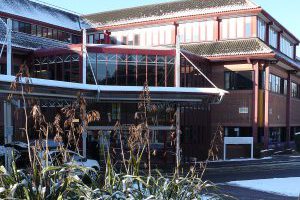
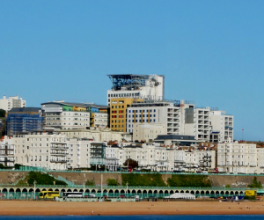
Local Amenities/Attractions
Haywards Heath is situated in the heart of the Sussex countryside with the town a short walk from the Hospital. There are many restaurants and bars, a leisure complex and a train station with easy access to Brighton, Gatwick and Crawley.
Brighton’s nightlife is legendary and boasts over 200 bars and pubs. It has a thriving music scene, the biggest arts festival in England and an eclectic mix of shops and restaurants within this truly diverse cultural city. The beautiful South Downs and stunning countryside that surround Brighton are right on the doorstep.
Foundation Specific
Induction/Shadowing Arrangements
As a doctor entering the Foundation Programme, you are required to complete a period of induction and shadowing with your employer before formally taking up your F1 post. This provides you with an opportunity to work closely with the doctor who is currently in the post you are due to take up and to familiarise yourself with the department and hospital settings.
The Medical Education team will assign you a shadowing partner. In most cases, this will be the out-going F1. However, this may not always be possible and in this case we will assign you another doctor to shadow in your new team.
Feedback received from F1s who attend this Shadowing Week is always very positive and we strive to make this time as interactive as possible.
Tasters
There is an established policy for F2 study leave which works well. F2s are encouraged to take taster sessions between August and December where possible. F1s are also allowed to take their taster sessions early, in the last few months of their F1 year (in lieu of taking it in F2) if this is more convenient.
Simulation
Simulation-based training forms an integral part of training within the Trust and is used to develop clinical staff across teams and disciplines. We provide high fidelity training for all F1 and F2 doctors on the BSMS university campus, as well as in the Simulation Suites at the Princess Royal Hospital and the Royal Alexandra Children’s Hospital. In addition to a variety of acute scenarios mapped against the Foundation curriculum, we deliver simulation-based training on Met calls, Stroke calls and patient transfer. Non-technical skills training includes leadership, communication and team-work. Training to improve cognitive abilities focusses on decision making, risk assessment, managing uncertainty and professional judgment. In addition to events in lecture theatres and training rooms, exciting in-situ simulation sessions are organised throughout the Trust, including several preparation events for the Brighton Marathon.
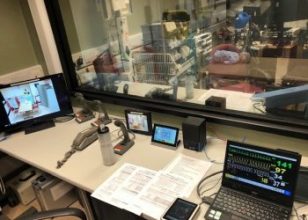
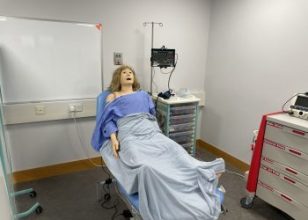
Foundation Doctor Forums
F1 and F2 representatives are vital part of our local education governance structures and their feedback is an important mechanism for change and improvement. Foundation doctor reps act as an intermediary for the foundation doctor body and are required to canvas the opinions of their peers and facilitate a two-way feedback stream with the Foundation Faculty Group (FFG), supporting an on-going process of education governance and quality improvement.
At least two or three reps are appointed for each year group. Reps attend the FFG meetings (held 3 times a year) and present feedback from their peer group. They also have a role in disseminating information to the wider group. They may hold informal discussions at intervals with other foundation doctors and may also liaise with the programme directors as required in between meetings.
Foundation reps also attend the Doctors’ Forum (JDF), which is chaired by the Guardian of Safe Working Hours.
Educational and Clinical Supervision
Every foundation doctor is allocated an Educational Supervisor for the whole year and a Clinical Supervisor for each rotation. Supervisors are allocated by the Medical Education team and supervisors’ names and contact details will be given out to doctors at the start of the year.
It is expected that each doctor will arrange to meet up with their Educational Supervisor within the first two weeks of their foundation year and then at intervals throughout the year to coincide with their rotations, and again at the end of the year. Doctors should also arrange to meet their Clinical Supervisors within the first two weeks of each rotation and again towards the end of each rotation. It is the foundation doctor’s responsibility to ensure that all required supervisor meetings take place and are document on the Horus e-portfolio system. This is essential for ARCP (sign off).
Although we are unable to allocated Educational Supervisors based on specialty, we can put doctors in touch with a specialty champions should they have a particular interest for career development.
Teaching Programme
There are 83 F1 posts and 69 F2 posts across a range of specialties, and this also includes Leadership, Medical Education, and Academic specialty posts. Rotations include:
| Accident & Emergency | Neurosurgery |
| Acute Medicine | Obstetrics & Gynaecology |
| Anaesthetics | Oncology (F1) |
| Cardiology | Paediatrics |
| Elderly Medicine | Paediatric Surgery (F2) |
| Endocrinology | Palliative Care |
| ENT | Psychiatry |
| Gastroenterology | Rehabilitation Medicine |
| General Internal Medicine | Renal Medicine |
| General Practice (F2) | Respiratory Medicine |
| General Surgery (F1) | Stroke Medicine |
| GUM/HIV | Trauma and Orthopaedics |
| Haematology (F1) | Urology |
| Infectious Diseases | Vascular Surgery (F2) |
| Neurology |
This diversity of posts as well as different locations ensure that our Foundation Training Programme will provide a wide range of clinical experience.
We expect foundation doctors to undertake on average three hours of education per week. Part of this time is covered by the teaching programmes for F1 and F2 doctors and the rest is provided by teaching within departments. Foundation doctors are allocated dates to attend ILS, acute simulation day training or ALS as appropriate. The training programme is supported by excellent Library facilities on both sites with a dedicated Librarian to support foundation doctors.
We take careers advice and support very seriously. There is well structured support of any doctor who experiences difficulties, either personal or professional and we have been praised by the Foundation School in how we support doctors through difficult times.
Any Additional Information
Please contact us via the Foundation admin team (contact details above) should you have any questions about Foundation training at our Trust and working and living in Brighton and Sussex.
Trust Information
Accolades/Achievements of the Trust
Our Trust is one of the largest University Teaching Hospitals groups in Kent, Surrey and Sussex. We provide high quality medical education for medical students, doctors and many other healthcare professionals.
Our expertise in a wide variety of specialties makes us an excellent and exciting place for postgraduate training; our services span the entire spectrum from standard DGH services to Regional specialties. Our services spread over different hospitals including the Princess Royal Hospital and the Royal Alexandra Children’s Hospital.
Over one million patients come through our doors per year and you will see a broad range of interesting cases. With the 3T’s (Teaching, Trauma, Tertiary Care) development underway, the Royal Sussex County Hospital in Brighton is well on its way to becoming an established Major Trauma Centre, offering our doctors unique experiences and development opportunities. We also have thriving Simulation, Human Factors and Leadership training programmes.
Central to our ambition is our role as an academic centre, a provider of high quality teaching, and a host hospital for cutting edge research and innovation. On this we work with our partners, Brighton and Sussex Medical School, Health Education England, South Thames Foundation School, as well as our local universities. We foster an ethos of multi-disciplinary learning which sets the tone for high quality patient care.
